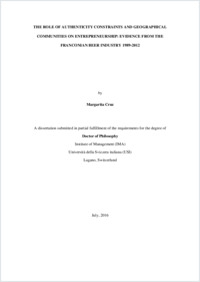The role of authenticity constraints and geographical communities on entrepreneurship : Evidence from the Franconian beer industry 1989-2012
- Cruz Barrientos, Margarita
- Beck, Nikolaus (Degree supervisor)
- Wezel, Filippo Carlo (Degree committee member)
-
26.08.2016
166 p
Thèse de doctorat: Università della Svizzera italiana, 2016
Organizational authenticity
Geographical communities
Entrepreneurship
Competition
Naming strategies
Family firms
English
This dissertation focuses on the barriers that authenticity brings to entrepreneurial outcomes such as entry of new organizations, product diversification, and introduction of new products in traditional industries. Advancing theory on organizational authenticity and geographical communities, this thesis argues that authenticity is not only an asset that organizations can choose but also a barrier for entrepreneurial attempts and the renewal of an industry. The main argument is that when community members seek after authenticity and local traditions, the establishment of new organizations and the introduction of new products can threaten the maintenance of community traditions and regional identity. In addition, geographical proximity between producers and consumers enables the development of a tightly knit fabric of relationships between market actors that are difficult to overcome by entrepreneurs. This thesis further elaborates on the resources upon which producers can rely on to overcome these constraints. In particular, family ownership and product naming strategies prove resourceful when introducing new products in traditional industries. The Franconian beer industry (Northern Bavaria, Germany) is the empirical context where I test these arguments. Being one of the oldest industrial agglomerations in Europe, the Franconian beer industry stands for a highly traditional cluster of breweries where producers and community members have a strong interest in preserving their authenticity. Founding rates as well as the product portfolio of more than 300 breweries are observed for the period 1989-2012.
- Language
-
- English
- Classification
- Economics
- License
-
License undefined
- Identifiers
-
- RERO DOC 277347
- URN urn:nbn:ch:rero-006-115471
- ARK ark:/12658/srd1318678
- Persistent URL
- https://n2t.net/ark:/12658/srd1318678
Statistics
Document views: 312
File downloads:
- Texte intégral: 222
